
Anthony James Donegan, known as Lonnie Donegan, was a British skiffle singer, songwriter and musician, referred to as the "King of Skiffle", who influenced 1960s British pop and rock musicians. Born in Scotland and brought up in England, Donegan began his career in the British trad jazz revival but transitioned to skiffle in the mid-1950s, rising to prominence with a hit recording of the American folk song "Rock Island Line" which helped spur the broader UK skiffle movement.

Brotherhood of Man are a British pop group who achieved success in the 1970s. They won the 1976 Eurovision Song Contest with "Save Your Kisses for Me".
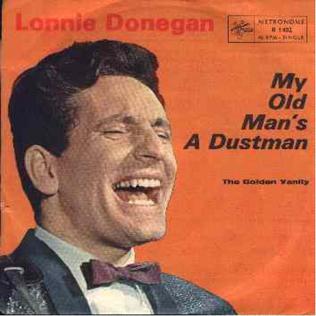
"My Old Man's a Dustman" is a song first recorded by the British skiffle singer Lonnie Donegan. It reached number one in the British, Irish, Australian, Canadian, and New Zealand singles charts in 1960. The chorus of the song is:
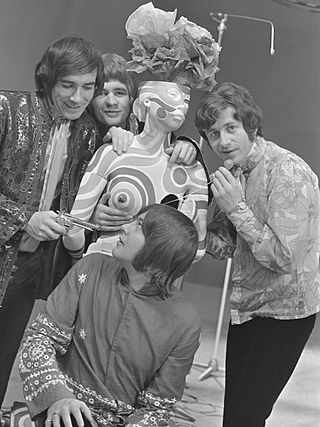
The Flower Pot Men were an English pop group created in 1967 as a result of the single "Let's Go to San Francisco", recorded by session musicians, which became a major UK Top 20 and Continental Europe hit in the autumn of 1967. The group's sound was characterised by rich, three-part vocal harmonies.

Anthony Burrows is an English pop singer and recording artist. As a prolific session musician, Burrows was involved in several transatlantic hit singles throughout the late 1960s and early 1970s, most of which were one-hit wonders, including "Love Grows " by Edison Lighthouse, "United We Stand" by Brotherhood of Man, "My Baby Loves Lovin'" by White Plains, "Gimme Dat Ding" by the Pipkins and "Beach Baby" by the First Class.
"The Harvest Of Love" is a short comedy song, co-written and originally performed by Benny Hill, released on Pye Records (7N.15520). The other writer was shown as "M. Anthony", a pseudonym for the producer, Tony Hatch. The song was a #20 hit in the UK Singles Chart in 1963, and has appeared on several compilation albums as well as being covered by the Wurzels. The Benny Hill version was flipped with another Hill composition, "BAMba 3688". The record also saw a U.S. release on Rust (5079).
The Eagles were a British music quartet active from 1958 until the mid-1960s. They formed in 1958 at the Eagle House youth club in Knowle West, Bristol.
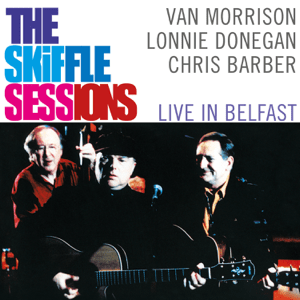
The Skiffle Sessions – Live in Belfast is a live album by Northern Irish singer-songwriter Van Morrison, with Lonnie Donegan and Chris Barber, released in 2000. Lonnie Donegan had played with the Chris Barber jazz band when he had his first hit with "Rock Island Line"/"John Henry" in 1955. He had been a childhood influence on Van Morrison, who had performed in his own skiffle band with schoolmates when he was twelve years old in Belfast, Northern Ireland. This was Donegan's second album in twenty years, reviving his career until his death in 2002.
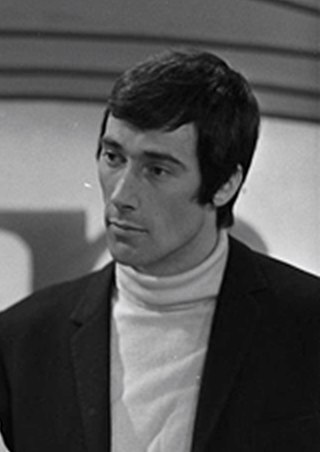
Roger Frederick Cook is an English singer, songwriter and record producer, who has written many hit records for other recording artists. He has also had a successful recording career in his own right.
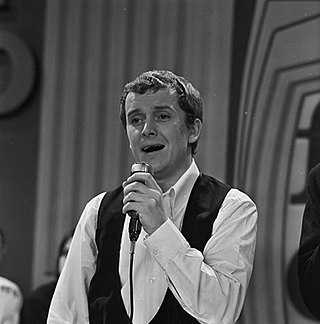
Roger John Reginald Greenaway is an English singer, songwriter and record producer, best known for his collaborations with Roger Cook and Tony Burrows. His compositions have included "You've Got Your Troubles" and the transatlantic million selling songs "I'd Like to Teach the World to Sing " and "Long Cool Woman in a Black Dress". They were the first UK songwriting partnership to be granted an Ivor Novello Award as 'Songwriters of the Year' in two successive years.

White Plains were a British pop music group that existed from 1969 to 1976. They had an ever-changing line-up of musicians and five UK hit singles, all on the Deram Records label, in the early 1970s.
John Nicholas Shakespeare, known as John Carter, is an English singer, songwriter, and record producer.
The Undertakers are a British beat group, contemporaries of the Beatles and a leading group in the Merseybeat music scene of the early 1960s.
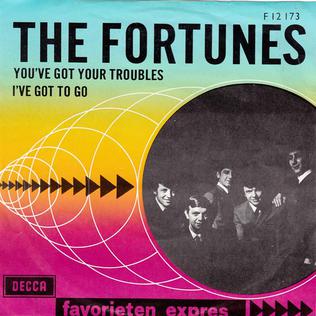
"You've Got Your Troubles" was the inaugural composition by the prolific songwriting team of Roger Cook and Roger Greenaway in 1964. "You've Got Your Troubles" became a number 2 UK hit for the Fortunes in the United Kingdom in August 1965, affording the group international success including a Top Ten ranking in the US. The track was included on the Fortunes' self-titled 1965 debut album release, the group's only album release of the 1960s.
"Rock Island Line" is an American folk song. Ostensibly about the Chicago, Rock Island and Pacific Railroad, it appeared as a folk song as early as 1929. The first recorded performance of "Rock Island Line" was by inmates of the Arkansas Cummins State Farm prison in 1934.

United We Stand is the debut album by The Brotherhood of Man. It was released in 1970 on Deram.
Kenneth Alan James Hawker known as Ken Lewis, was an English singer, songwriter and record producer. He is considered one of the more successful songwriters of the 1960s as a result of his collaborations with John Carter. His biggest success was "Can't You Hear My Heartbeat", which was a 1965 US number 2 hit single for Herman's Hermits.

"My Baby Loves Lovin'" was first released by the British pop group White Plains. The song was written and produced by Roger Cook and Roger Greenaway, recorded on 26 October 1969, and released on 2 January 1970 on the Decca Records imprint, Deram Records. It is a world-wide chart success and the top selling single for White Plains.

"Melting Pot" is the 1969 debut single from UK pop group Blue Mink. The song was written by Blue Mink's lead singer Roger Cook and long-time songwriter partner Roger Greenaway.












